Summary 
This handsomely mounted production moves the Elizabethan romantic comedy to 1920s New England, eschewing the more typical urban-rural conflict for a sunny environment of bicycles-for-two, hooded flash cameras on tripods, and crank-up Victrola record players. Although the modernization has little impact on the story, the costuming is elaborate and colorful, and the music is particularly well conceived, from a rousing ragtime piano score to a barbershop quartet crooning Orlando's love poems. Most of the supporting characters are played with a welcome subtlety - especially the silver-haired old Jacques - but the core romance between an expressive Rosalind and a muscular Orlando is at times overwhelmed by the literally colorful portrayal of Touchstone. The performance is so strong as to be hard on the eyes, a rapping and dancing clown in green vest, red jacket, and top hat, swigging booze and breaking into comic routines, both a highlight and a weakness of an otherwise elegantly staged Great Lakes Theater production.
Design
Directed by Edward Morgan. Scenic design by Russell Metheny. Costume design by Kim Krumm Sorenson. Lighting design by Rick Martin. Sound design by Joe Court. Choreography by Martin Cespedes.
Cast
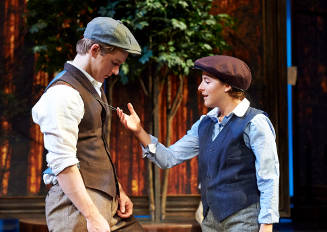
David Anthony Smith (Jacques), Torsten Johnson (Orlando), Aled Davies (Adam/Corin), J. Todd Adams (Oliver), Andrew Voss (Charles/William), Christine Weber (Celia), Betsy Mugavero (Rosalind), Dustin Tucker (Touchstone), Dougfred Miller (Duke Senior), Eric Damon Smith (Amiens), Juan Rivera Lebron (Silvius), Atlie Gilbert (Audrey).
Analysis
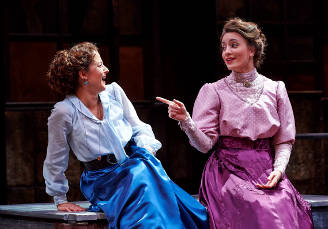
Edward Morgan directs As You Like It for Cleveland's Great Lakes Theater, bringing the romance from Arden to 1920s New England. Morgan creates a pleasant atmosphere for the play, foregoing the usual city-versus-country conflicts such as urban decay versus rural renewal. The charming forest environment features old-time vinyl records being played on a hand-cranked Victrola record player and portrait photography from a big-flash, hooded camera wobbling on a precarious tripod, and it inspires Celia to pop a lollipop into her mouth and Touchstone and Audrey to continue their romance giggling upon a bicycle-built-for-two. Morgan accents with colorful aspects, like a non-imposing search party being a couple of cops wielding big flashlights and street denizens being northeastern Moms on horned bicycles. The Forest of Arden is populated with laid-back hunters holding shotguns in their crossed arms, wearing boots and hats and vests while birds sing in the distance.
Morgan's use of music fares even better, especially the rousing ragtime score that smacks of Scott Joplin. In a particularly inspired moment, Orlando's clumsy love poems to Rosalind are not just read aloud, but sung in four-part harmony by an earnest barbershop quartet wearing straw hats and red-striped shirts and carrying black vaudeville-house canes. The always-clumsy appearance of Hymen at the conclusion is handled with ingenuity by Morgan, who replaces the intervention by the goddess of marriage with a surprise guest-star appearance from a strutting African-American jazz-god singer who rocks the house with a booming baritone.
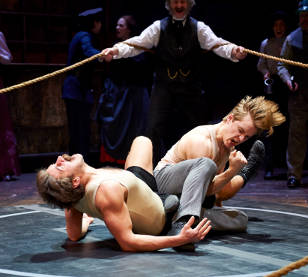
Morgan introduces his primary love interests 1.1 and 1.2. Orlando appears first, muscular and confident but frustrated by his brother, whom he manhandles face first into a metal bucket of water. When Rosalind appears in her stylish blue suit 1.2 to watch the wrestling match, the world stops for Orlando as he gazes at her, people around him freeze-framed. The onstage crowd grasps ropes to create a makeshift ring, and the overmatched Orlando struggles against the bigger wrestler Charles, who throws aside his drinking cup pre-bout, then slaps Orlando's bottom and roughly throws him down. Orlando appeals to the referee, but Charles takes the opportunity to bite Orlando on the leg until Orlando, inspired by cheering encouragement from Rosalind and Celia, flips Charles over his shoulder and defeats him with a twisting arm bar. Orlando may be suitably heroic, but Betsy Mugavero's Rosalind is a charmingly confused heroine, mouthing "oh no!" as the victorious Orlando proclaims himself the son of Sir Rowland, then rolling over backward on a wheeled cart 1.3 in her girlish crush, her hands over her heart in love. She shows admirable resolve, defying the usurping Duke 1.3 - "my father was no traitor!" - before falling to her knees in self-defense. She accepts a blessing from a clergyman 2.1, emerges disguised as a man 2.4, and after a manly chat with Corin, interrupts Phoebe to chastise her for her lack of romantic feeling. Mugavero's Rosalind continues a heroic ascent, finalizing the arrangements for the conclusion 5.2 with an energetic team-huddle fist-bump, and re-arriving 5.4 to stun everyone as a young woman in her white gown and long flowing hair.
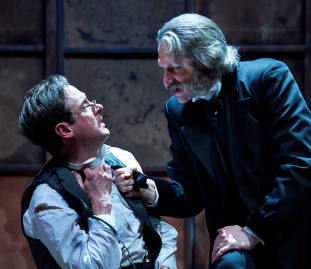
The supporting performances are solid, pleasantly subtle when they could be over-the-top, but still physically funny enough to suit the romantic situation. Oliver is a tightly wound wanna-be-villain in vest and tie, a bowler hat, spats over dress shoes, and bad luck with his spectacles: Adam retrieves the glasses from the bucket after the fisticuffs with Orlando, and Oliver simply growls, "you old dog"; then he sways in punch-drunk attention 3.1, talking to the Duke with the broken glasses barely staying on his face. When he discovers Rosalind's secret disguise, he lets her know that he knows with a long stare. Phoebe is an oversexed country girl, sniffing Rosalind 3.5 like a hound and liking what she smells, ignoring Silvius's pleas - "sweet Phoebe, pity me!" - until forced to accept him 5.4, then grabbing his flowers and embracing him with a big kiss. Even better than Christine Weber's bemused and world-wise Celia, purple clad and licking her lollipop 2.4 or making wry faces at the high-school puppy love antics of 3.2, is David Anthony Smith's emotionally soft-spoken Jacques. The silver-bearded old poet in black, tears in his eyes at a 2.5 song, encourages more from the barbershop quartet - "come; warble" - and they continue with a multi-harmony "Struggle and Strife." The "Seven Ages of Man" speech is halting and impassioned, immediately preceding the 2.7 passing of old Adam as well as intermission. Jacques's decision to follow the converted Duke at the conclusion plays as a welcome final opportunity for a spiritual old man.
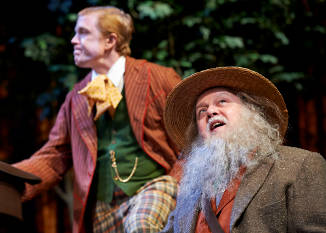
The most remarkable performance - both good and bad, in energetic style versus narrative effect - comes from Dustin Tucker as Touchstone, a scenery-chewing and scene-stealing clown in a green vest over a red jacket, a top hat and loud flannel pants. He is so colorful as to be hard on the eyes, dancing 1.2 in spinning kick moves, wheeling the luggage in 2.4 with exaggerated effort, then laughing and swigging from a flask at Rosalind's attempts to pass for a man. Tucker's Touchstone is generally fun and funny, but soon plays with such abandon as to overwhelm the story and especially the sweet romance at its center. During 3.2 he feigns vomiting at Orlando's love letters, delivering a caustic hip-hop rap version of his own, and in 5.1 he intimidates his rival suitor by brandishing an axe, threatening to kill William "one hundred and fifty ways," then pretending with comic overkill not only to pull out his heart, but to eat it as well, then hurl it to the stage and stomp on it with his foot, and finally chop it apart with his axe. He arrives with Audrey 5.3 upon a bicycle built for two, setting up a picnic complete with champagne, until the two are rolling over and over each other in a pawing and mauling - Audrey "no, no, no"; Touchstone: "yes, yes, yes" - carnal heap. During the 5.4 denouement, Tucker's Touchstone seems the primary character, clapping his hands and tap-dancing with windmill arms and rapping out the names of the vices until finally subdued by news of the Duke's conversion. The spectacle is certainly lively and entertaining, but it overwhelms the rest of the production, like the lovely loyalty shown by Adam and Celia, accompanying their friends into the danger of banishment, or Silvius 4.3, so tormented by feelings for Phoebe that he can only sob into a handkerchief with such emotion that he fails to respond to Rosalind's questions.
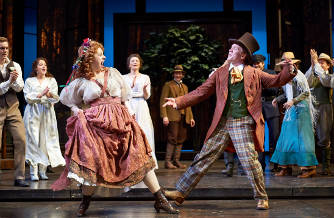
Morgan's conclusion is extended by another song, after the shepherd Corin orchestrates the serving of champagne to everyone onstage, as well as by some well-choreographed group dancing. Mugavero's plucky Rosalind of course concludes the performance with a charming sense of blushing happiness, and one wonders whether this elegantly staged production would have benefited from even more focus on her and her romantic entanglements.